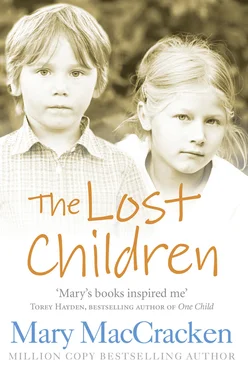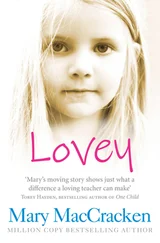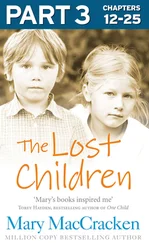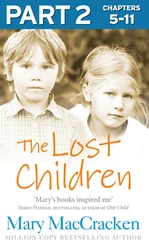I lead him to the coat hooks and point to the hook farthest on the right.
“This is yours,” I tell him. “This is where you will hang your coat.”
He does not pull away from me now but stands silently as I write CHRIS in large red-crayon letters on the wall above the hook. Defacing church property? So be it.
“Get your coat, Chris. Hang it here.”
Wrong. He laughs and runs again.
I go and get him once again and we go together to the center of the room where his discarded coat lies on the floor and I take his hand and guide it to the coat – but he will not pick it up and instead slumps slack and boneless to the floor, laughing his shrill laugh.
I prop him up, my hand closes over his, and we take the coat and hang it on the hook beneath his name.
“Good for you,” I say.
But there is a tapping at the door and he does not even seem to hear me now. Instead, he finds two drumsticks in the wooden chest and takes them and climbs up on the jungle gym in the corner of the room, climbs until he reaches the highest platform – and there he folds his legs beneath him, and his mind inside him and his gray eyes look blankly down.
You are so small, I think. Seven years, and you cannot weigh more than fifty pounds. Your eyes seem bigger than the rest of you; they dominate your small, square face like diffuse gray clouds covering a sky … But I have watched and I have seen you be aware; I remember when your eyes would clear, lit from behind – and I will have more of this.
I go to the door to investigate the tapping. A stout woman is there, holding a large, curly-haired boy in her arms.
“Miss MacCracken?” Her speech is cultured, almost
English in articulation. “I understand that you will be filling in for Joyce. A tragic thing. Tragic. For her as well as for our poor children. Well, there’s nothing to do but make the best of it.”
She comes into the room, where Chris is beating a tattoo on the highest platform of the jungle gym, and stands the boy on the floor, takes off his red bonnet and mittens; then lays him on the floor and takes off his white shoes so that she can get the red snow-suit over his feet – unzips his overalls and feels inside his rubber pants.
“Oh, dear. He’s wet again. Never mind, I’ll fix it.” And she changes him there on the floor.
Then she rises and hands me the plastic bag of diapers, first removing two baby bottles full of milk, complete with rubber nipples.
“I’ll put these in the refrigerator for you, although I must say I don’t think much of that refrigerator. It must be at least five years old – not even a separate freezer so the poor children can have ice cream. Still, we mustn’t complain, must we? Now, the baby food is in the bag. It will be all right until you open the jars; then be sure to refrigerate it. Poor girl. It must be difficult for you to get the hang of things. Well, you can always call me. I’m never far from Bradford if he needs me.”
She kisses him then and calls to Chris, “Good morning, Christopher. Have fun with Bradford.”
She addresses me: “My, Christopher is athletic, isn’t he? Climbing way up there. Well, each of us has our own strengths. And the boys Christopher and Bradford do have such a marvelous time together.”
She left then before I could speak. Which was perhaps just as well. The only thing I could think to do was to look at Brad’s folder; perhaps I would regain some semblance of reality.
There it was. Brad. Bradford Turner. I checked the birth date. He was six years old.
My God, I thought, what kind of a class is this?
I was to find out later that this was the most difficult class I would ever teach, the hardest, the lowest-functioning. Four untoilet-trained boys, three of whom were nonverbal, ranging in age from five to eight. But I was unschooled – and while I knew it was somewhat different from Helga’s class, in my naïveté I thought, “Well, at least it’s a challenge. In a way, I’m lucky – there’s no way to go but up.”
Then in my mind’s ear I heard Helga’s voice, “You sound like a shitty Pollyanna. Get to work.” And I laughed out loud.
Louis was brought in by one of the women drivers and I recognized him immediately. If his name was not familiar to me, his blue football helmet was, and I remembered hearing the staff psychiatrist discussing him in Renée’s room. There was discussion as to whether he should be placed in her room for the remaining days. This would be his last year at the school; he was having multiple seizures now, sometimes as many as four or five in one hour. While it was never stated in words, most of us were sure these were epileptic in nature.
There was nothing much to do for Louis now except make sure his small football helmet was securely fastened to protect his head, should he fall beyond reach, and to cover him until he woke again after an attack. He was staying on at the school only until his parents could find a suitable residential setting for him. Some of the staff thought that it was wrong to keep him on in a school designed for the emotionally disturbed – wrong for him and an imposition on the teachers who had not been trained, and did not want to give the kind of custodial care Louis needed. But the Director wanted him there.
His parents had been strong supporters of the school, grateful and willing helpers, and the Director felt a loyalty and a responsibility to help them now. And right or wrong, if the Director wanted him there, he stayed. So the problem had been temporarily resolved by moving Louis from Renée’s room to Joyce’s. Joyce was more tolerant, her room more removed, and Louis’s unnamed but ever-increasing seizures were less noticeable and distracting to the other children and teachers …
Louis’s driver hands me his bib and an extra set of clothing and says, “Had a seizure on the way over. Went stiff – then right out – but he came to soon enough. Seems all right now.”
I take off his hat and coat and he climbs upon the jumping-jack rocking horse and starts the motion that he will keep up all day unless he is lifted off – up and down, up and down – the springs beneath him groaning under the weight of his eight-year-old body. Saliva runs down his chin and I wipe it with the first of many Kleenexes and say, “Good morning, Louis,” but his blue eyes do not focus and the motion does not stop – up and down, up and down. I wonder if there is such a thing as mental masturbation.
Someone crashes against the door and I open it to Tom, the boy who ran down the stairs so many eons ago when I was first searching for Helga’s classroom. Tom is a tall, frail boy with wispy black hair falling across his eyes. All his shirts and sweaters have turtlenecks, which he unfolds and pulls up over his chin and eyes whenever a situation grows too threatening.
Tom has a bell in one hand; the other is behind his back. He emerges from the turtleneck, clangs the bell, and shouts, “Circle time!”
“Thank you,” I answer. “Good morning, Tom.”
“Good morning, Tom,” he replies, and leaves us.
Circle time. The formal day at the school began with Circle each morning. It was the only time during the day when the Director observed all of us closely and noted the relationship between child and teacher, teacher and teacher, and improvements and lapses in each child. At the beginning of Circle we all sang to each child, singling him out, making him special, and on Wednesday afternoons at staff meetings there would be references to how the child acted. Group singing followed the individual greeting, and then the galloping and skating exercises and other games, which the Director said were designed for “gross motor development.” These were followed by more social, nursery-school-type games where the children chose partners and again the Director watched for “peer relationships.”
Читать дальше












